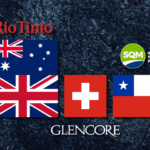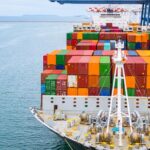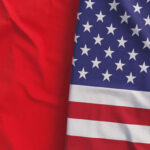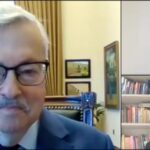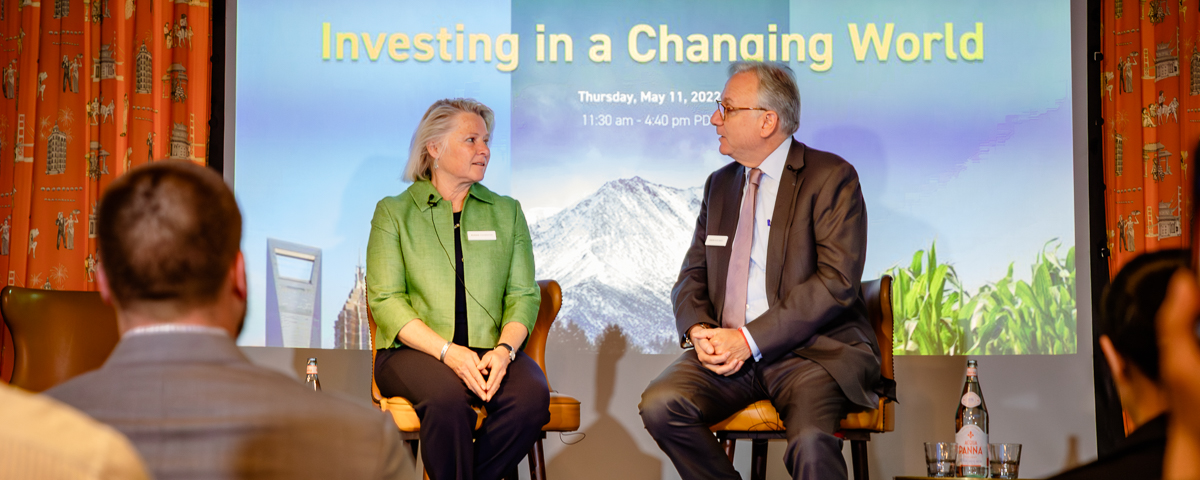
Susan Thornton on Navigating the Future of U.S.-China Relations
For decades, Susan Thornton has been “in the room where it happens” when the U.S., China, and other Asia powers engage in high-stakes negotiations. With her extensive background, including serving as acting Assistant Secretary for East Asia Pacific Affairs and holding critical positions in U.S. embassies, Thornton's resume speaks volumes. Her vast expertise and dedication are evidenced by her negotiations with North Korea, her involvement in shaping U.S.-China relations, and her current roles at renowned organizations, including the Brookings Institution and Yale Law School. KraneShares' discussion with Thornton on navigating the future of U.S.-China relations at our second annual West Coast Investment Forum offered our investors exclusive insights into the inner workings of U.S. diplomacy.
Thornton was joined by KraneShares General Counsel and former U.S. Ambassador to Singapore, David Adelman. Adelman leads an ongoing discussion series at KraneShares featuring policymakers and thought leaders on diplomacy and U.S.-China relations. Recent programs have included discussions with former U.S. Secretary of State Henry Kissinger, former U.S. Secretary of State John Kerry, former Senior Advisor to U.S. Secretary of State Antony Blinken Jessica Chen Weiss, U.S. Ambassador to China during the Trump Administration Terry Branstad, U.S. Ambassador to China during the Obama Administration Max Baucus, and former U.S. Secretary of the Navy Ray Mabus.
Key takeaways from Thornton’s discussion at the KraneShares Second Annual West Coast Investment Forum:
- There are positive signs of renewed determination to resume meetings between U.S. and Chinese officials and strengthen the guardrails of the relationship.
- The U.S. administration recognizes the importance of managing its relationship with China for American interests and global alliances.
- Economic integration and cooperation between Taiwan and China show robust ties despite security concerns.
- Geopolitical issues discussed include the semiconductor industry in Taiwan, China's involvement in resolving the Russia-Ukraine conflict, China's global role in diplomacy, and U.S.-China trade relations.
- Despite decoupling rhetoric, U.S.-China trade is at all-time highs, and both countries continue to find ways to connect and collaborate.
- Finding effective and targeted measures that balance economic cooperation and national security objectives is complex but achievable.
We have summarized the key highlights of the discussion and provided a video below.
Improving U.S.-China Relations
Thornton believes that the U.S. administration recognizes the importance of managing its relationship with China in the interest of the American people and global alliances. Thornton explained, “We are at a pivotal moment right now. I think the Chinese and many on the U.S. side would say U.S.-China relations have been difficult… What we see now in terms of determination on both sides is to ensure that things don’t get off track.” Relations looked like they were improving in mid-November 2022 when Chinese President Xi Jinping and U.S. President Joe Biden spoke on the sidelines of the G-20 Summit in Bali, Indonesia. At the time, these meetings were primarily characterized as substantive and constructive in establishing a baseline for further discussions to avoid conflict. However, this plan was derailed due to the February 3rd balloon incident. Fortunately, Thornton noted that we’ve seen a reenergizing of determination to try and get those meetings back on track.
Thornton went on to tell the audience that Nick Burns, the current U.S. Ambassador to China, met with China’s Foreign Minister Qin Gang in Beijing on May 8th, a few days before our San Francisco event took place. Thornton noted that this was the first meeting between the two since Qin Gang was appointed Foreign Minister in late 2022. According to Thornton, the meeting “symbolizes Beijing’s receptivity to starting high-level discussions with the U.S.” and its determination to strengthen the guardrails of the relationship. Since then, we have seen another meeting by Nick Burns with China’s Commerce Minister Wang Wentao on May 11th. Thornton noted that Minister Wentao also will travel to the U.S. to prepare for San Francisco’s Asia-Pacific Economic Cooperation Leaders’ Summit (APEC) this fall. Thornton explained that meetings would be held regularly leading up to the summit between all participating global representatives, including a meeting in Detroit where Minister Wang will be present. Thornton believes these meetings are a positive sign.
Beyond Ambassador Burn’s meetings, on the same day as our San Francisco event, Thornton told the audience that a two-day closed-door session between U.S. National Security Advisor Jake Sullivan and the topmost foreign policy official in China Wang Yi concluded in Vienna, Austria. Officials did not disclose to the public that this meeting would occur, which Thornton believes “is a sign that there is a desire on both sides to try to get more concrete discussions without the posturing.”
Adelman and Thornton agree that stabilizing and constructively managing relations is in both countries' interests. There is pressure on both sides globally to achieve stable relations, as the world recognizes the effect a healthy U.S.-China relationship can have economically and geopolitically. Thornton stated, “There was an agreement in Bali to have a series of meetings to organize principals, how to manage the relationship, and that is what I hope they get back to.”
Taiwan
Thornton believes China is concerned about “slippage in the long-standing U.S. policy towards Taiwan.” China’s concerns stem from the U.S.’s increased communication and military support for Taiwan and U.S. efforts to bring international attention to the issue. China's doubts were exacerbated when U.S. Speaker of the House Nancy Pelosi visited Taiwan in August 2022. Thornton emphasized that while past speakers have visited the island, like Newt Gingrich in 1997, the recent visit by Nancy Pelosi was precedent-setting because the circumstances of that visit were much different than in 1997. While Thornton believes that “Congress has always seen itself as a protector of Taiwan,” today’s increased levels of interaction are “at a level that's kind of beyond what we've seen in the past.”
Thornton expects that U.S. National Security Advisor Jake Sullivan will continue to meet with his Chinese counterpart to discuss the issue further and emphasize that the U.S. has not strayed from the One China Policy established in 1972. Thornton also “doesn’t see a near-term military push by China.” Thornton told the audience that there was no indication of an imminent aggressive military push based on ongoing discussions she’s had with other Chinese experts. However, she expressed concern about the potential for accidents or incidents in the region due to the presence of planes and ships, which could escalate tensions.
Regarding the semiconductor industry in Taiwan, Adelman mentioned that the “uniquely world-class, semiconductor and chip foundry ecosystem in Taiwan has endured to the benefit of China” and that “It's been the subject of a lot of hand wringing in Washington.” Thornton noted that she recently visited Taiwan Semiconductor Manufacturing Company (TSMC) in March, the world’s largest contract chip producer. Thornton told the audience that she understood how such a “stunning industry” was born in Taiwan through her trip. The people she met “seem quite confident about their ability to manage both the Mainland and the U.S.”
Despite tensions and security concerns, cross-strait trade between Taiwan and China continues to grow, even during the pandemic. The economic connections are robust and show no signs of change. As illustrated by Adelman’s example, the assembly of iPhones by Foxconn, a Taiwanese company in China, highlights the interdependence between the two regions. Daily business interactions, including flights, tourism, and student exchanges, continue to thrive. Thornton emphasized that while security issues and political tensions may dominate the headlines, the economic ties between Taiwan and China remain strong.
Russia-Ukraine and China’s Global Stance as a Mediator
Thornton believes China has embraced an increased role in actively engaging with European countries. Thornton told attendees that China’s Foreign Minister recently met with European officials in Germany and Paris, working on “how to move the Ukraine war into a place that can put it on a path to some kind of peaceful settlement.”
China's President Xi Jinping recently held a phone call with Ukraine's President Volodymyr Zelensky, which Thornton believes European nations welcomed. Thornton described this action by President Xi as “something that everyone was waiting for.” She emphasized the significance of this call, as China had been openly supportive of Russia and had limited interaction with Ukraine. Thornton also thinks, “Europeans are hoping that the Chinese can use their influence with Russia because the end of this war is kind of in Putin’s hands, and no one has more influence on Putin than Xi Jinping. It doesn't mean Xi Jinping has much influence over Putin, but he has more than anyone else.”
Additionally, Thornton mentioned that China has been careful not to ship items to Russia that would violate U.S. sanctions. Overall, Thornton has hope for improved direction in addressing the Russia-Ukraine conflict with China's involvement.
Adelman shared his belief that China is increasingly stepping onto the world stage as a global diplomat and mediator under President Xi. He referred to the agreement between Saudi Arabia and Iran to re-open embassies in each other’s capitals, which China brokered. Thornton agreed and offered her take on China’s rising global stance. She recounted a speech in 2005 by the former Head of the World Bank Robert Zoellick, in which Zoellick urged China to be a responsible stakeholder and use its influence to contribute to global problem-solving. Thornton found it surprising that China is now taking on this role years later, despite the challenges caused by the pandemic. Thornton stated, “It’s quite risky, which is why I'm surprised they're doing it. But when I was in Beijing in March for the China Development Forum, I was told that they will start doing this kind of thing more, that Xi Jinping is pushing them to do more extroverted, diplomatic mediation and negotiation.” Thornton believes we should all welcome China’s increasing global diplomatic influence and that it would be helpful if the U.S. could accept China's efforts to mediate other long-standing conflicts around the world, which she believes can help with the “rekindling of diplomacy between the two.”
U.S.-China Trade Relations
Adelman labeled the current U.S.-China trade story as “phenomenal.” He highlighted that China is America's third-largest trading partner, with only Mexico and Canada ahead of China. He stated, "U.S.-China trade is hitting all-time highs. This is more evidence that despite the political rhetoric, the two largest economies in the world are fundamentally intertwined."
Thornton said that “it's almost inevitable to be the case because China is the second largest economy, largest population, the largest importer of energy, the largest importer of food, and number one trading partner for 120 countries around the world.” Thornton believes it is challenging to decouple from China entirely because businesses find ways to adapt and work around preventative measures. Thornton believes that China and the U.S. will continue to find ways to connect and collaborate on the business front, regardless of geopolitical tensions.
Thornton mentioned that she served as acting Assistant Secretary of State during the Trump administration. She explained that many individuals, including those in the National Economic Council, knew the trade war would not yield the desired outcomes. Thornton said she anticipated the current situation and emphasized that "businesses find ways to work around things like sanctions. These things don't have a track record of actually panning out very well."
Thornton also highlighted the energetic economic activity in China following the lifting of COVID lockdowns and believes there will be ongoing efforts to strengthen business ties between China and the United States. She noted the increasing number of Chinese delegations visiting the U.S. and the invitations for Americans to travel to China. Thornton stressed the need for continued practical engagement between the two countries at a grassroots level.
Adelman also mentioned that there had been discussions in Washington about limiting Chinese foreign investment in the United States and even imposing restrictions on American investment in China. Thornton acknowledged the persistent rumors about executive orders or controls on Chinese investment in the United States. Thornton explained that while the goal of preventing large-scale U.S. capital from flowing into the Chinese defense industry is discussed frequently, she "thinks there are so many second and third order effects to doing it, that no one has come up with a clean way to formulate a compelling executive order."
Overall, the conversation suggests that while there is ongoing discussion and consideration of trade and investment restrictions between the U.S. and China, finding effective and targeted measures aligned with national security objectives is complex. Thornton believes the focus is on balancing economic cooperation and preventing specific military advancements in China.
Conclusion
KraneShares was honored to have Susan Thornton as a guest speaker, providing invaluable insights into the future of U.S.-China relations. Thornton's extensive background and impressive resume speak to her expertise and dedication to diplomacy. Thornton's nuanced perspectives shed light on the complexities and challenges in managing U.S.-China relations and the importance of fostering increased communication and peaceful coexistence between the two nations.

